
Canvassing the Masterpieces Merahi metua no Tehamana by Paul Gauguin altmarius
An 1893 oil on canvas, Merahi Metua no Tehamana (Tehamana Has Many Parents or The Ancestors of Tehamana), by Paul Gauguin (1848-1903) the French post-impressionist painter. Painted in Tahiti, one of the final works completed by the artist there during his first visit. Tehamana was the teenage girl Gauguin lived with.
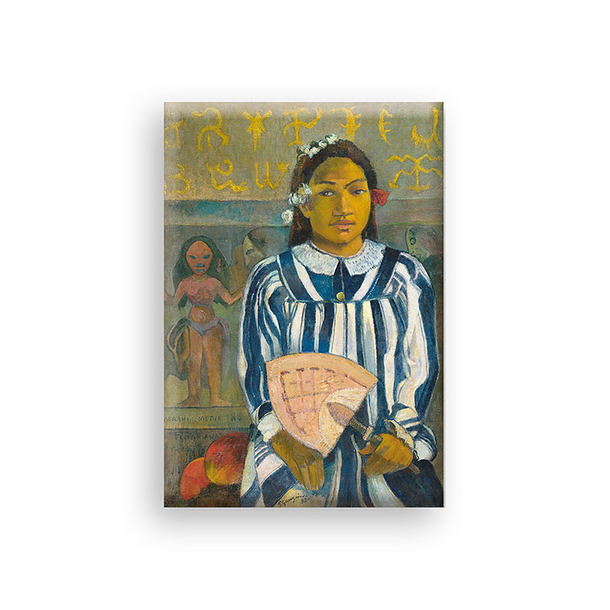
Gauguin "Merahi metua no Tehamana" Boutiques de Musées
An 1893 oil on canvas, Merahi Metua no Tehamana ( Tehamana Has Many Parents or The Ancestors of Tehamana ), by Paul Gauguin (1848-1903) the French post-impressionist painter. Painted in Tahiti, one of the final works completed by the artist there during his first visit. Tehamana was the teenage girl Gauguin lived with.
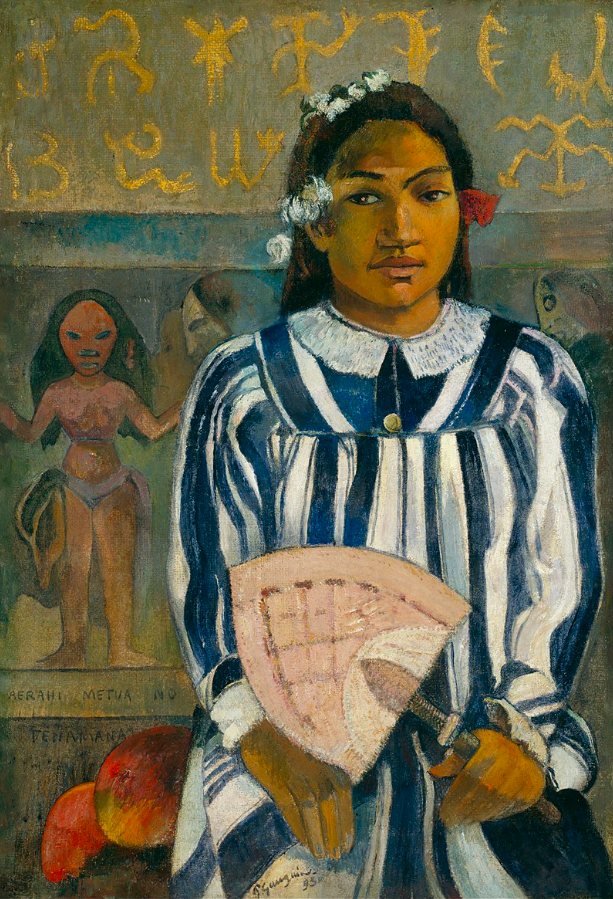
Merahi Metua no Tehamana by Gauguin (Illustration) World History Encyclopedia
Merahi metua no Tehamana (Tehamana Has Many Parents or The Ancestors of Tehamana) 1893 Paul Gauguin French, 1848-1903 In this portrait, the 13-year-old Tahitian girl named Tehamana appears stoic, shoulders squared and gaze unflinching. She wears a missionary dress and wields a Samoan fan as white flowers tumble from her hair.

Merahi metua no Tehamana (les aïeux de Tehamana) Paul gauguin, Lovers art, Hang canvas art
This is a painting about history. Polynesian and Pacific cultures first encountered by Europe in the 18th century had no written records, but Gauguin portrays Tahiti as a place with an intense.

Print of The Ancestors of Tehamana or Tehamana Has Many Parents (Merahi metua no Tehamana
Merahi metua no Tehamana (Tehamana has many parents in English) is an 1893 painting in the Post-Impressionist style by the leading French artist Paul Gauguin. Gauguin painted this portrait of his thirteen-year-old companion and later wife during his first trip to Tahiti, from 1891-1893.
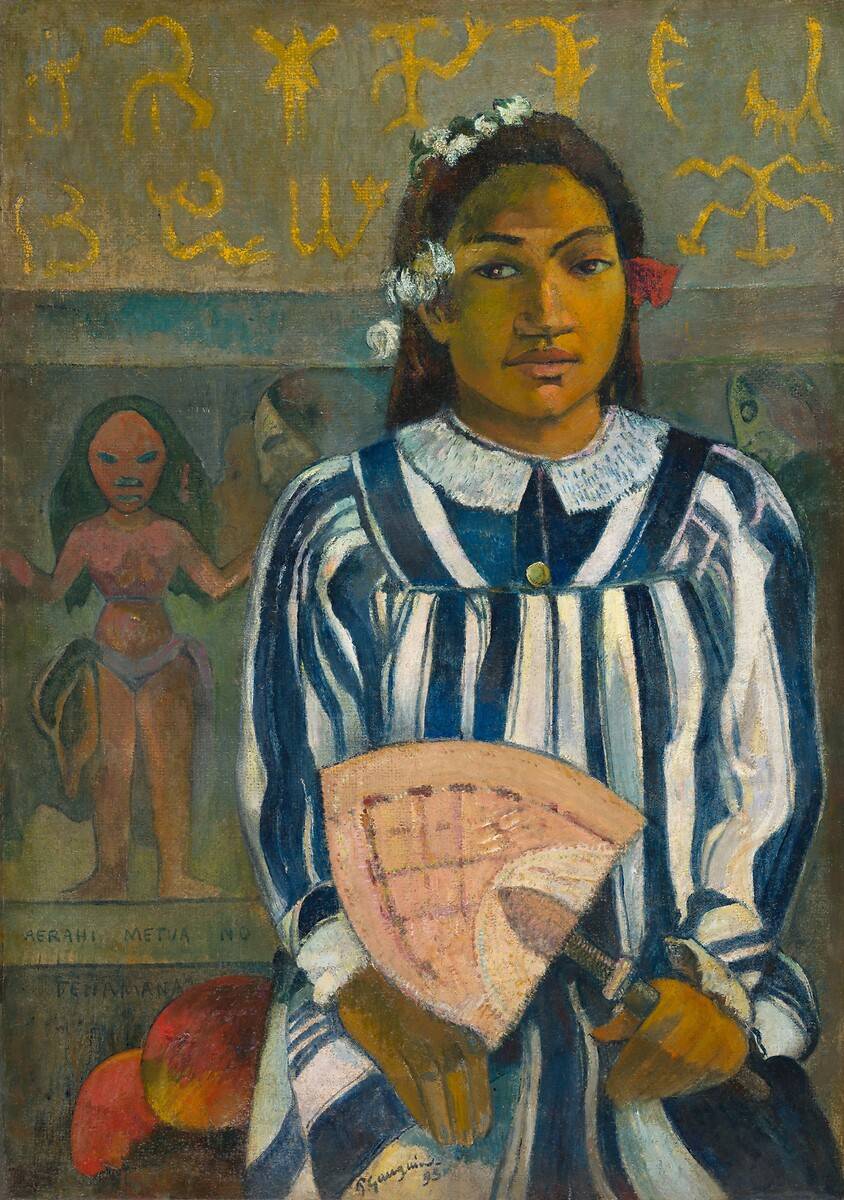
Merahi metua no Tehamana de Paul Gauguin Reproduction tableau
In this picture, 'The Ancestors of Tehamana or Tehamana Has Many Parents (Merahi metua no Tehamana)' she poses in a fashion that was both modern and local - a dress in the modest style approved by the long-standing missionary culture, accented by a local fan and the signature Polynesian tiare flowers strewn in her hair.

Reprodukcja Merahi metua no Tehamana obraz na ścianę malarza Paul Gauguin sklep bimago
Merahi metua no Tehamana (Tehamana Has Many Parents or The Ancestors of Tehamana) by Paul Gauguin - June 17, 2020 Merahi metua no Tehamana Source: Wikimedia Commons As a human being, Paul Gauguin is somewhat infamous in the art world.

Tehura. Noa Noa. Epreuve unique gravée d'après le tableau Merahi metua no tehamana de Paul
Merahi Metua no Tehamana (Tehamana Has Many Parents), 1893. Image courtesy of the National Gallery of Art. Much of Paul Gauguin's life has been subject to scrutiny. Best known as a painter, he was also a sculptor, a printmaker,.
Merahi Metua No Tehamana Images Free Photos, PNG Stickers, Wallpapers & Backgrounds rawpixel
Merahi metua no Tehamana (Tehamana Has Many Parents or The Ancestors of Tehamana) by Paul Gauguin | USEUM e-Card 3.9K 3 9.5 (4) Merahi metua no Tehamana (Tehamana Has Many Parents or The Ancestors of Tehamana) by Paul Gauguin Paul Gauguin traveled to rural France and then abroad in search of inspiration for his art.

Merahi Metua No Tehamana YouTube
Merahi metua no Tehamana. oil on canvas • 76.3 × 54.3 cm. Paul Gauguin 1893 The painting is a portrait of Paul Gauguin's native Tahitian wife Teha'amana, made during his first visit to the island from 1891-1893. This marriage has always provoked controversy: it was arranged and completed in the course of a single afternoon and Gauguin.
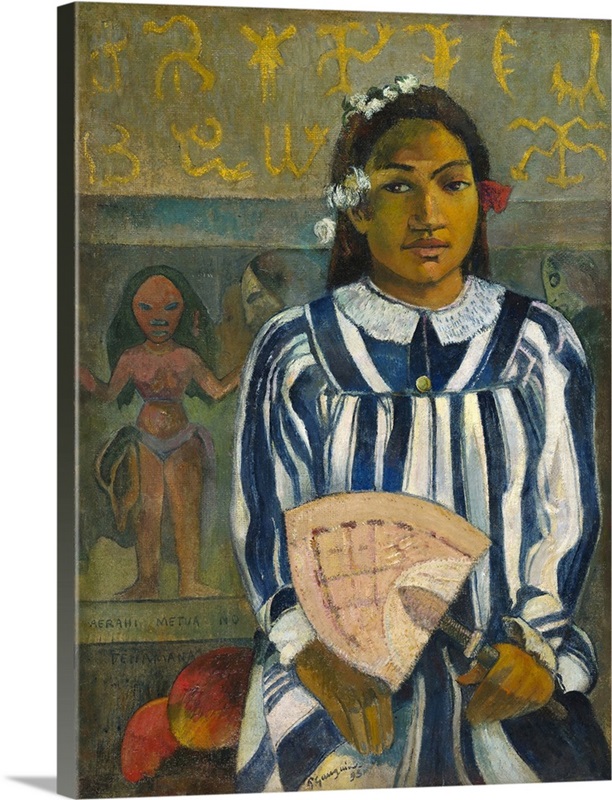
Merahi metua no Tehamana (Tehamana Has Many Parents or The Ancestors of Tehamana) Wall Art
Merahi metua no Tehamana ( Tehamana Has Many Parents or The Ancestors of Tehamana) 988 1893 Oil on jute canvas; 75 × 53 cm (29 1/2 × 20 7/8 in.) Signed and dated: P. Gauguin - / 93 (near center of bottom edge, in dark-blue paint) Inscribed: MERAHI METUA NO / TEHAMANA (lower left, in dark-blue paint)

Tehamana Has Many Parents or The Ancestors of Tehamana (Merahi metua no Tehamana) (1893) by Paul
Merahi Metua no Tehamana (The Ancestors of Tehamana or Tehamana has many parents) is a portrait by Gauguin painted in 1893. Tehamana has many parents, referring to her having her natural parents as well as foster-parents as per the Tahitian customs during the marriage. The art is currently at the Art Institute of Chicago.

Merahi Metua No Tehamana 1893 Paul Gauguin Eugène Henri Paul Gauguin 1848 1903 era un
Merahi metua no Tehamana (English Tehamana Has Many Parents or The Ancestors of Tehamana) is an 1893 painting by the French artist Paul Gauguin, currently in the collection of the Art Institute of Chicago. The painting is a portrait of Paul Gauguin's native wife Teha'amana during his first visit to Tahiti in 1891-1893.

Inscriptions Signature and date bottom center P Gauguin bottom left MERAHI METUA NO TEHAMANA by
Merahi metua no Tehamana (Tehamana Has Many Parents or Ancestors of Tehamana). (Tehamana Has Many Parents or Ancestors of Tehamana) Cats. 51-60 Noa Noa Suite. Cats. 64-71 Monotypes. Cat. 72 Mahana no atua (Day of the God) Cat. 90 No te aha oe riri (Why Are You Angry?) Cats. 91-105
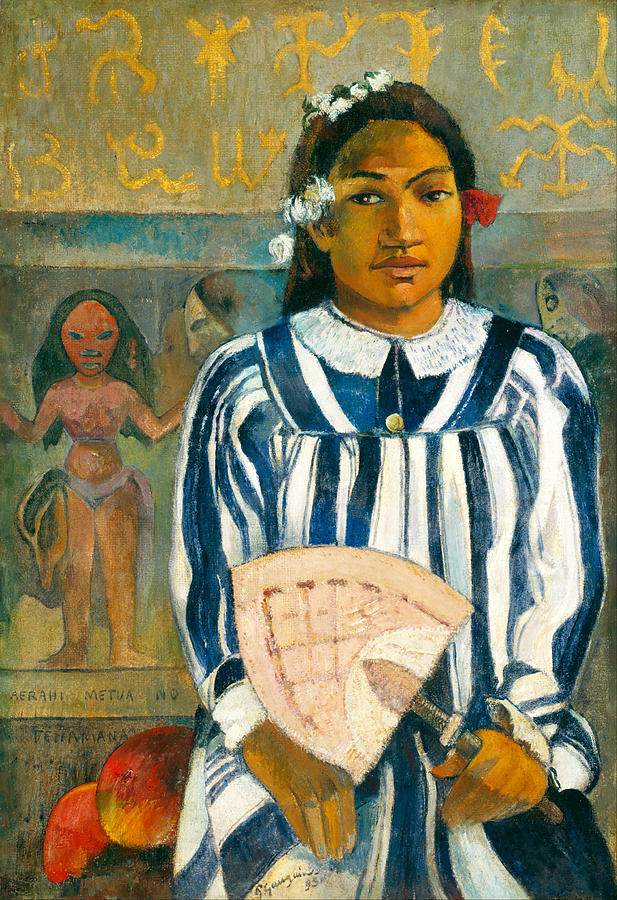
The Ancestors of Tehamana OR Tehamana Has Many Parents.Merahi metua no Tehamana. Painting by
Merahi metua no Tehamana (English Tehamana Has Many Parents or The Ancestors of Tehamana) (1893). Oil painting. Art Institute of Chicago Warning The original file is very high-resolution. It might not load properly or could cause your browser to freeze when opened at full size. Summary[edit] artist QS:P170,Q37693 Details on Google Art Project Title
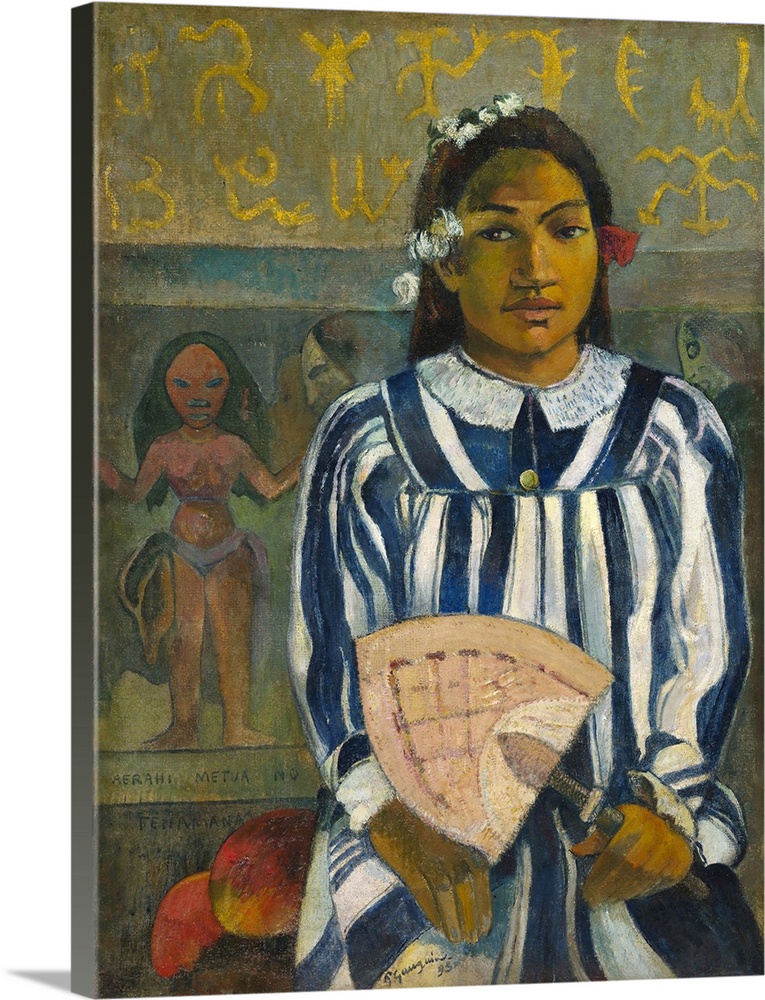
Merahi metua no Tehamana (Tehamana Has Many Parents or The Ancestors of Tehamana) Wall Art
Detail of the signature in Gauguin's Merahi metua no Tehamana (Tehamana Has Many Parents or The Ancestors of Tehamana) (1893). The Art Institute of Chicago, 1980.613. fig. 1.7. Detail of the signature in Gauguin's Mahana no atua (Day of the God) (1894). The Art Institute of Chicago, 1926.198.